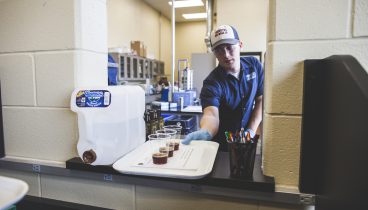The future belongs to top quality products.
First Key provides specialized and practical Quality Management Systems (QMS) to ensure your customers receive your best every time.
Quality Management Systems (QMS)
- QMS Manual Development
- QMS Implementation
- QMS Sustainability Audit
QMS is a system for management and assurance of product quality. It provides a statement of “quality policy,” and details procedures and methods by which the policy is to be adhered to. A QMS also sets out quality goals and how they will be achieved. It defines responsibilities for each manufacturing stage and product quality and it defines actions for what is to be done at each quality-critical manufacturing stage. It lays out a standard systematic method for handling quality issues (e.g. out-of-spec product).
A classic QMS starts with a strategic statement of the company’s quality policy/philosophy. It then outlines the specific procedures and instructions of who does what, when, where and how. This includes instructions on how work is done, sampling plans, reporting format, specifications, recipes, corrective actions and laboratory analytical methods. These are laid out in a “QMS Manual”.
First Key’s QMS manual is a comprehensive knowledge base for all QMS procedures and guidelines. When we produce the QMS manual, we consider all variables that can affect product quality, including raw materials sampling and storage, lab analysis and how to resolve non-conforming product issues. We provide in-depth descriptions of processes and policies, develop recording and reporting systems and educate staff on their specific roles within the Quality Management System, as well as the overall objectives and rationale of the QMS. Finally, the QMS manual describes how to assess the effectiveness of the QMS through periodic post-implementation audits.
Step 1 – QMS Manual Development
First Key’s QMS is for the management and assurance of product quality. Naturally, the intent is to keep it simple but also effective.
QMS Manual Format:
- Introduction – contains a QMS rationale and definition.
- Quality Policy – a statement of management’s quality commitment as well as the policy and specific quantified quality goals.
- Organization – shows who is responsible for what in regards to quality, as well as individual responsibilities.
- Description of Process Unit Operations – contains specific focus on quality-critical operations and activities at the overall plant and department level. This may include:
- Plant overview
- Raw material receiving and storage
- Brewhouse
- Yeast Management
- Fermentation
- Maturation and Stabilization
- Packaging (Bottling, Canning, Kegging)
- Warehousing
- Utilities and Maintenance
- Laboratory (Test equipment, methodology)
- Specifications – raw materials, in-process product, finished product.
- Sampling plans – for all raw materials used and at critical points in the process.
- Analytical – microbiological, chemical, packaging and sensory.
- Recording Systems
- Reporting Systems – Operator, Management. May also outline which statistical techniques are to be used.
- Non-conforming Products – details how to resolve out-of-spec issues.
- Education and Training – outlines prerequisite credentials of those responsible for quality.
- Post Audit – describes periodic system for assessing if QMS if functioning properly.
Step 2 – QMS Implementation:
- Explain QMS to senior management, who must champion the QMS
- Develop and confirm quality policy
- Identify quality-critical areas in the process. Incorporate into the QMS, adapting as necessary
- Write new procedures to cover quality-critical operations (work instructions, specifications, recipes)
- Set realistic targets
- Train staff in new systems and methods
- Plan for post-implementation audits to review effectiveness of new practices and amend as necessary (on-going, 3 days quarterly). Submit quarterly conformance reports
Step 3 – QMS Sustainability Audit
Regular audit and follow up is critical to sustaining a QMS in your operations, which creates the conditions for you to create consumer satisfaction through the delivery of high quality, consistent product. First Key assigns experienced and internationally known brewers and distillers, process engineers and quality specialists to conduct independent audits on all process and quality systems and at all stages in the production process.
QMS Audit Objectives:
- To determine if the process is properly designed, defined and documented.
- To determine conformity or nonconformity of the quality system elements with specified requirements.
- To determine the effectiveness of the implemented quality system in meeting specified quality objectives.
- To provide the audited plant management with an opportunity to take timely corrective action to eliminate deficiencies.
- Supplemental objectives to meet regulatory requirements and/or to achieve certification (ISO 9000 for example) may also be included.
QMS Audits need to be performed on a regular basis. The quality audit can take from a few days up to two weeks, depending on the size and complexity of the company. It encompasses a review of process and quality documentation, plans and activities. A Conformance Report is prepared and includes recommendations for adjustments. The report results are discussed with local management, corrective and preventive actions are agreed and a time schedule for action is set. Successive audits include a report on completion of the previous audit’s action plan. A sensory evaluation of in process and finished product will be conducted during the audit and reported.






